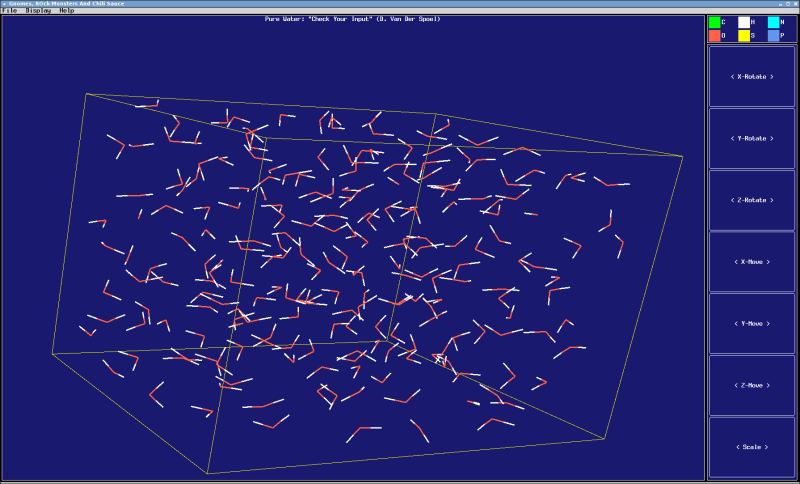GROMACS is a molecular dynamics simulator, with building and analysis tools.
GROMACS is a versatile package to perform molecular dynamics, i.e. simulate the Newtonian equations of motion for systems with hundreds to millions of particles.
It is primarily designed for biochemical molecules like proteins and lipids that have a lot of complicated bonded interactions, but since GROMACS is extremely fast at calculating the nonbonded interactions (that usually dominate simulations) many groups are also using it for research on non-biological systems, e.g. polymers.
It provides extremely high performance compared to other competitors. A lot of algorithmic optimizations have been introduced in the code. The software is normally 3-10 times faster than any other program.
There is ongoing development to extend GROMACS with interfaces both to Quantum Chemistry and Bioinformatics/databases.
Features include:
- User-friendly, with topologies and parameter files written in clear text format. There is a lot of consistency checking, and clear error messages are issued when something is wrong.
- There is no scripting language – all programs use a simple interface with command line options for input and output files.
- Extensive manuals provided free of charge in electronic or paper format.
- Integrated graphical user interface available for all programs
- As the simulation is proceeding, GROMACS will continuously tell you how far it has come, and what time and date it expects to be finished.
- Both run input files and trajectories are independent of hardware endian and can thus be read by any version GROMACS, even if it was compiled using a different floating-point precision. All files from GROMACS 2.0 can further be used in the new version 3.
- Write coordinates using lossy compression, which provides a very compact way of storing trajectory data. The accuracy can be selected by the user.
- Large selection of flexible tools for trajectory analysis – you won’t have to write any code to perform routine analyses. The output is further provided in the form of finished Xmgr/Grace graphs, with axis labels, legends, etc. already in place.
- A basic trajectory viewer that only requires standard X libraries is included, and several external visualization tools can read the GROMACS file formats.
- Can be run in parallel, using standard MPI communication.
- Contains several state-of-the-art algorithms that make it possible to extend the time steps is simulations significantly, and thereby further enhance performance without sacrificing accuracy or detail.
- Includes a fully automated topology builder for proteins, even multimeric structures. Building blocks are available for the 20 standard aminoacid residues as well as some modified ones, the 4 nucleotide and 4 deoxinucleotide resides, several sugars and lipids, and some special groups like hemes and several small molecules.
Website: www.gromacs.org
Support: Tutorial
Developer: David van der Spoel, Berk Hess, Erik Lindahl, and many contributors
License: GNU General Public License v2.0

GROMACS is written in C++ and C. Learn C++ with our recommended free books and free tutorials. Learn C with our recommended free books and free tutorials.
Return to Scientific | Return to Biology Tools | Return to Chemistry Tools | Return to Bioinformatics Tools
| Popular series | |
|---|---|
| The largest compilation of the best free and open source software in the universe. Each article is supplied with a legendary ratings chart helping you to make informed decisions. | |
| Hundreds of in-depth reviews offering our unbiased and expert opinion on software. We offer helpful and impartial information. | |
| The Big List of Active Linux Distros is a large compilation of actively developed Linux distributions. | |
| Replace proprietary software with open source alternatives: Google, Microsoft, Apple, Adobe, IBM, Autodesk, Oracle, Atlassian, Corel, Cisco, Intuit, SAS, Progress, Salesforce, and Citrix | |
| Awesome Free Linux Games Tools showcases a series of tools that making gaming on Linux a more pleasurable experience. This is a new series. | |
| Machine Learning explores practical applications of machine learning and deep learning from a Linux perspective. We've written reviews of more than 40 self-hosted apps. All are free and open source. | |
| New to Linux? Read our Linux for Starters series. We start right at the basics and teach you everything you need to know to get started with Linux. | |
| Alternatives to popular CLI tools showcases essential tools that are modern replacements for core Linux utilities. | |
| Essential Linux system tools focuses on small, indispensable utilities, useful for system administrators as well as regular users. | |
| Linux utilities to maximise your productivity. Small, indispensable tools, useful for anyone running a Linux machine. | |
| Surveys popular streaming services from a Linux perspective: Amazon Music Unlimited, Myuzi, Spotify, Deezer, Tidal. | |
| Saving Money with Linux looks at how you can reduce your energy bills running Linux. | |
| Home computers became commonplace in the 1980s. Emulate home computers including the Commodore 64, Amiga, Atari ST, ZX81, Amstrad CPC, and ZX Spectrum. | |
| Now and Then examines how promising open source software fared over the years. It can be a bumpy ride. | |
| Linux at Home looks at a range of home activities where Linux can play its part, making the most of our time at home, keeping active and engaged. | |
| Linux Candy reveals the lighter side of Linux. Have some fun and escape from the daily drudgery. | |
| Getting Started with Docker helps you master Docker, a set of platform as a service products that delivers software in packages called containers. | |
| Best Free Android Apps. We showcase free Android apps that are definitely worth downloading. There's a strict eligibility criteria for inclusion in this series. | |
| These best free books accelerate your learning of every programming language. Learn a new language today! | |
| These free tutorials offer the perfect tonic to our free programming books series. | |
| Linux Around The World showcases usergroups that are relevant to Linux enthusiasts. Great ways to meet up with fellow enthusiasts. | |
| Stars and Stripes is an occasional series looking at the impact of Linux in the USA. | |
